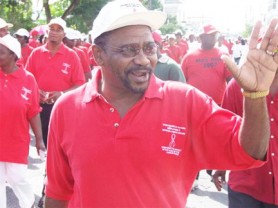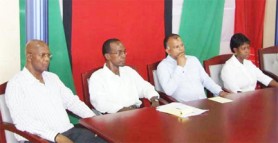It would be an error to think that Robert Corbin is the People’s National Congress’s only problem. He is, however, the greatest obstacle to solving the party’s problems. His defenders might think that the party’s third leader represents continuity, legitimacy and fidelity to the founders’ ideals and that removing him would be a sacrilege that would lead to a breakdown.
But the cracking, crumbling and collapsing are already taking place in spite, or on account, of Corbin’s leadership.

Corbin won the leadership contest convincingly. He secured 614 votes compared to the 223 that were cast for his sole challenger Winston Murray; 847 votes which were cast from an official list of 1, 175 delegates. Although the election has been criticised, Murray accepted the results. He conceded, “I am prepared to accept the results…Because the margin is so wide, that even if there were – as I believe there were – flaws in the process and irregularities in the procedures, it is clear that Mr Corbin would have won.”
Leadership, however, is more than winning a majority of votes in a patently lopsided contest in which the party’s financial and material resources – posters, placards and all – were mobilised behind the incumbent. As Forbes Burnham the party’s founder said several years ago, “The distinction between the good and bad leader is whether the person wants leadership for his own, individual, selfish benefit or that of a small group, or if he is seeking the position of leadership because he is convinced that he can do the maximum for the greatest numbers.” The tests of leadership are the quality of service to the membership and the vitality of the organisation and those are the standards by which Corbin’s nearly seven-year tenure must be measured.
Theatre
Magnanimous in victory, Corbin declared theatrically, “What we witnessed in the past few months in the PNCR was democracy in action.” He added, “Those who had any doubts about democracy within the PNCR should now hold their breath and think again before making such remarks.” He went on to emphasise that while every member of the party is free to have differing views, the membership would ultimately make the final decision which would have to be respected.
Almost immediately after the conclusion of the congress, he prescribed remedies to heal the divided party.
These steps were meant to resolve the simmering resentment and ensure full participation of all members and supporters. But, without addressing the fundamental problems of inner-party democracy and organisation reform and without embracing the factions that have aligned themselves to stalwarts such as Vincent Alexander and Richard Van West Charles, how serious is Corbin about reconciliation and reform?

The most remarkable reaction to Robert Corbin’s re-election as leader of the People’s National Congress was the resignation with which party members and supporters received the tidings. So thoroughly had the party been exhausted as a movement for independent thought and intelligent discussion that, apart from a few letters to the daily newspapers, hardly a murmur has been heard from what, supposedly, is a national party that represents over one third of the population.
To add to party members’ embarrassment and discomfort, President Bharrat Jagdeo extended congratulations on behalf of the People’s Progressive Party-Civic administration to Corbin on his retention of the leadership of the party and, consequently, leadership of the Opposition in the National Assembly. Head of the Presidential Secretariat Dr Roger Luncheon, in a condescending and derisive statement read to the media stated that “the administration anticipates that the renewal of the mandate given to Corbin, in the face of criticisms within and without the party, may indeed allow him to lead the party in a truly patriotic and national manner, resisting the appeals of some to political adventurism and extremism, particularly at this time in the history of Guyana.”
Jagdeo’s glee was unconcealed. He is clearly quite comfortable with the outcome.
He recognises that, under Corbin, the PNC has become politically weaker and, conversely, that should strengthen the PPP’s standing in the electorate. The 16th Congress confirmed that the corrosive effects of Corbin’s leadership will prevent the PNC from posing a credible challenge to the PPP in the next elections.
Democracy
Guyanese politics for the past fifty years has been based on the convention of bipolarity. This is reflected in the adversarial layout of the National Assembly between the administration side and the opposition and is embodied in the historical separation of the two major parties. Debates in the Assembly are based on dialogue in which it is recognised that there are two sides to any argument and from which − out of the classical collision of thesis and antithesis − a synthesis of opposites emerges as policy.
Dialectical democratic politics needs the administration and opposition which represent different interests in the country. Political parties should be accountable to the people who voted to be represented in the Assembly. That is the democratic way. Democracy should be more than one set of office-seekers competing against another set. As Forbes Burnham the party’s founder told the 14th Annual delegates Congress, “The party must be more than an election machine and a vehicle to be ridden by self-seekers. The party must be a vital organisation and a nationally cohesive force. It must translate its policies into action at the lowest levels and educate and train the people.”
But, the new politics implanted and nurtured by Desmond Hoyte and Robert Corbin in the PNC after Burnham’s death in the mid-1980s uprooted the old modes and nodes which the party used to renew itself from below. The debilitation of the party apparatus – including its youth arm, the Guyana Youth and Students Movement and its women’s arm, the National Congress of Women – and the erosion of its base in the trade unions – including the country’s iconic Guyana Labour Union of which the leader of the PNC was elected President General almost automatically – has withered. Traditional mobilisation of support from the public services and local government has been eroded by inappropriate policies over the past twenty-four years leaving little on which future reformers could build.
Corbin himself complained at the 15th Biennial Congress in 2005 about the state of the party. In his words: “Let us face facts, comrades, our local party is in disarray in many regions, districts, and neighbourhoods. This Congress as other Congresses in the past has stimulated a massive recruitment of members. But it is what happens after Congress that will be the test of their effectiveness. There is no consistent recruitment, little if any political education, irregular activities, few meetings and in some cases, none at all, irregular elections, no mobilisation, and no work in the community to make ourselves visible and useful to the community. Groups are mobilised for the purpose of Congress and our organisation goes into high gear primarily for the purpose of elections.”
Who is to blame if, two years later, the situation remains unchanged?
Party
What is clear is that the 16th Congress last August was not about policies and programmes. It was about personalities and occupying positions in the hierarchy. Corbin has made many speeches about change. After the crushing defeat at the general elections in 2006, he baldly told the party the following year at its 15th Congress: “We must recruit and train new talent, new thinkers, and new workers with energy and perspective. We must also begin early preparation for the 2011 elections. It will not be won by empty slogans and wild dreams but by hard work and effective organisation. It is my own aspiration not only to have the new team of leadership cadres identified by the next Congress but to hand over to them while still around to give the necessary support. This cadre of highly trained persons must be committed to the task of taking this Party forward as we retool for the challenges of restoring Guyana to its place of pride and prosperity.”
He misled party members into believing that change was in the offing. How then could the installation of the septuagenarians – 71-year old Oscar Clarke as General Secretary, 70-year-old Bishwaishwar Ramsaroop as chairman and 75-year-old Hamilton Green to the central committee – be reconciled with his promise to move the party forward? That Corbin would describe such a retrograde step as an indication that the party is one that is “capable of reconciliation and…of bringing back old members who are energetic and can contribute constructively towards the development of the party” was a warning of how far removed he is from reality.
Still, the People’s National Congress is Guyana’s second oldest, second largest and second most successful political party. Despite its dismal electoral performance in 2006, winning the support of 36 per cent of the electorate has imposed a heavy burden of responsibility on the Corbin. As leader of the main parliamentary opposition, however, he seems to be incapable of adequately articulating the interests of his constituents in debates in the National Assembly. The Guyana Youth and Students Movement and the National Congress of Women have been weakened. The party is losing its vitality.
The People’s National Congress is a broken reed. Congress has been converted into a compliant congregation from which apostates are quickly isolated. Despite the non-achievement of the party’s objectives, no savage motions of censure were passed at congress and there has been hardly a resignation from the party on grounds of conscience or principle. Covenants and pledges of past years remain unfulfilled. Supporters are running away as from a sinking ship.
Meanwhile, in the country at large, the party’s constituents groan under the burden of a reckless regime. The important things in life – education, employment, health, public safety – are threatened. The vital bauxite and sugar industries wobble while crime – narco-trafficking, gun-running, money-laundering and fuel smuggling – thrive. There is much to be done to improve the quality of life.
But Corbin is not the man to do it. He can’t and won’t. He has failed and, at this stage of his life, is impossible for him to change. Has the People’s National Congress become so useless that it will allow this man to lead them into a catastrophe at the next election?




